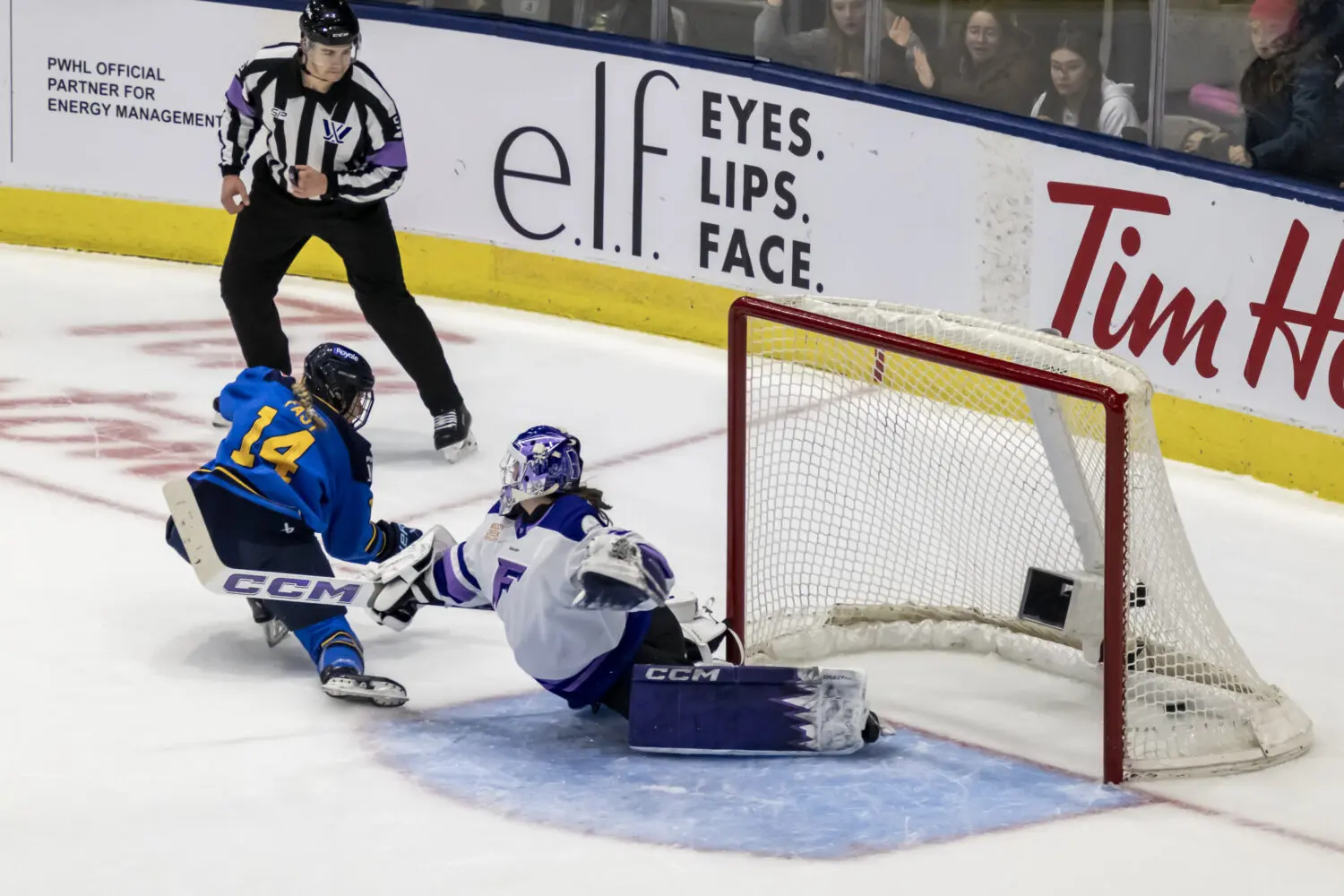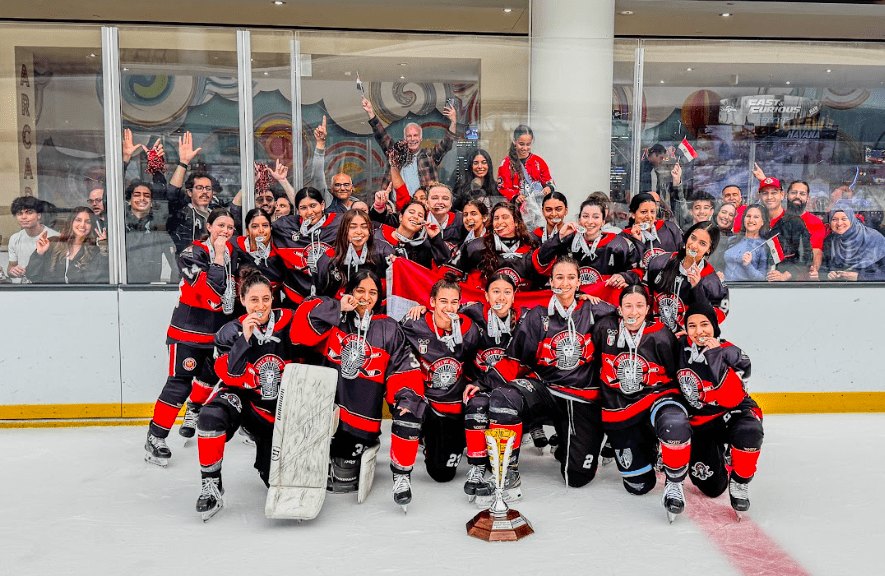
With the landmark 20th anniversary of women’s ice hockey at the Nagano Winter Games approaching, there were many people, and events, which were crucial in helping to make the possibilities a reality. Undoubtedly, the efforts of Fran Rider, whose Women’s World Championship in 1987 was the foundation upon which the rest of international hockey in the succeeding years was based, an event one year later was also a crucial catalyst.
As the city of Calgary hosted the world in the 1988 Winter Games, only the second time that Canada ever hosted an Olympic event (Montreal being the first in 1976), the feeling of national pride was met with curiousity for a very young hockey player. Raised in Mississauga, Ontario, Samantha Holmes was part of a generation of young women helping redefine the game, taking to the ice during a tumultuous time, which saw Justine Blainey take her right to compete, all the way to the Supreme Court in the late 1980s.
Surprised that women were not competing alongside their male counterparts in ice hockey at the 1988 Winter Games, Holmes felt there was a significant gap. Looking to correct this, Holmes took on a letter-writing campaign. The first step involved a letter to another prominent woman from Mississauga.
Known throughout Canadian culture as one of Canada’s most admired Mayors, the iconic “Hurricane” Hazel McCallion was more than a distinguished civic figure in Mississauga. Having played during her youth in Montreal (where she played on a team sponsored by Kik Cola), her love of the game never wavered. As a side note, the trophy for the 1987 World Championship was named in her honor.
Sharing a tremendous interest in the game, Holmes saw both, a role model and an empathic figure, in McCallion. Taking pen to paper, Holmes began composing what would prove to be one of the most important documents in modern women’s hockey, certainly an artifact worthy of a place in the Hockey Hall of Fame.
With subsequent letters to other dignitaries, Holmes found tremendous encouragement on the part of the respected office of McCallion. Ecstatic that such an effort was being taken seriously, Holmes would take on the part of both role model and admirable sporting activist, sending a positive message that women had every reason to be treated like equals.
“Well, I was only 10 years old and I had written to ‘Mayor Hazel’ before, as her office was always responsive. Yet, I was talking about a different issue this time so it was important. I think as the letter writing campaign took off, and then the President of the IOC at the time and the Prime Minister responded, I knew it was getting the attention it deserved.
At the end of the day, I was just expressing the sentiments of ALL girls playing hockey. There were many, many pivotal organizations and ‘adults’ that were working for the cause, but coming from a 10 year old passionate kid was a different story.”
Taking on the luster of sporting legend, Holmes’ empowering letter writing campaign would even gain mention, several years later, in Brian McFarlane’s enjoyably fun book, Peter Puck’s Big Book of Hockey.
During the 1992 IIHF Women’s Worlds, the landmark decision was reached to feature women’s ice hockey in the Winter Games, bringing validation to the efforts of so many dedicated individuals, including Holmes. Although the sport was not contested at the 1994 Lillehammer Winter Games, it would be on the schedule of events four years later in Nagano, Japan.
Along the way, Canada would capture the gold medal at the 1994 and 1997 IIHF Women’s Worlds, which saw the latter contested on home soil in Kitchener, Ontario. As a side note, the 2000 edition of the IIHF Women’s Worlds was contested in Mississauga. With the expansion of tournaments, eventually leading the way towards the current 4 Nations Cup, a staple of autumn hockey, Holmes’ own playing career ran parallel to such a formative time.
Although Holmes was not part of Canada’s roster at Nagano, she was an active competitor during the 1997-98 season. Skating for the New Hampshire Wildcats at the NCAA level, her time there proved to bridge generations. Three seasons later, the first Frozen Four national championship was contested, prompting more universities to adopt the sport into its athletic portfolio.

While Nagano heralded a new era for the women’s game, elevating it to an unprecedented importance, there was an element of mixed emotions. While Holmes experienced a tremendous sense of elation and attainment at women’s hockey enjoying the privilege of competing in the Winter Games, yet there was the devastating feeling of loss. Renewing rivalries in the gold medal game, Canada faced its most visceral loss, falling to their American archrivals. As a side note, Wildcats that were part of the Winter Games in Nagano included Karyn Bye, Colleen Coyne, Sue Merz and Tricia Dunn.
“Well, I was proud that the game of women’s hockey succeeded. Even through those 10 years, my goal was always to go to the Olympics (even though it was not an Olympic sport yet), I knew it would happen.
In 1998 I was playing hockey for the University of New Hampshire. Canada was the heavy favorite and I remember crying at the local bagel shop after a comment from one of the servers. I was wearing my UNH hockey jacket and she said, ‘Boy, you must be happy with the huge USA win last night.’ My heart sank and tear came to my eye. I just remember saying ‘I was cheering for Canada’.”
Worth noting, Holmes was not the only prominent activist in growing the game that suited up for the Wildcats during the 1990s. Andria Hunter, whose pioneering website remains an invaluable reference today, is among a unique sorority that competed at the university level in both Canada and the United States. Winny Brodt-Brown, a member of the first American team to capture a Clarkson Cup championship, is another notable Wildcats alum. Coincidentally, Holmes was in attendance at the 2010 Clarkson Cup finals, which saw Brodt-Brown’s Minnesota Whitecaps defeat the Brampton Thunder.
Following New Hampshire, Holmes would make her debut for Canada’s national team, gracing the ice at the Four Nations Cup. Although most of Canada’s roster for the event was composed mainly of competitors from Nagano, it was a cherished opportunity to see the real impact of her letter writing campaigns. Worth noting, Jayna Hefford, a member of Canada’s contingent in Nagano, had called Holmes a teammate once before, as both were joined by Sommer West, another eventual member of the national team, as members of Team Ontario in women’s ice hockey at the 1995 Canada Winter Games. In spite of Holmes being humble about the experience, it was a serendipitous moment that truly brought everything full circle:
“In all honesty, I did not really think about it. For me it was more about my passion to play the game I love. I mean, it was great to play with such talented, experienced players and learn all I could from them.”
Holmes’ career would also involve club play with the Brampton Thunder, adding her to the list of the number of legendary players that have skated for the iconic organization, and the Calgary Oval X-Treme in the Western Women’s Hockey League (WWHL). With the Oval X-Treme, Holmes would participate in the Esso Women’s Nationals, winning the Abby Hoffman Cup with a pair of goals in the 2003 final, the predecessor to the eventual Clarkson Cup. As a side note, Holmes also attended the selection camp for the Canadian team that was set to compete at the 2003 IIHF Women’s Worlds.
Worth noting, Holmes’ proactive approach to the game continued long after her notable letter writing campaigns. Serving as the founder of the Strathmore Rockies, the last expansion team in WWHL history, the club would eventually be amalgamated into the CWHL’s Team Alberta franchise. Serving as the first general manager in team history (who would later be rechristened the Calgary Inferno), it was the extension of a sterling yet unforgettable legacy.

Reflecting on Nagano, Holmes sees a much richer, more profound narrative. While she was proud to see the wondrous women of hockey take their place on the world’s biggest and most prestigious sporting stage, she sees the events that transpired as a victory for women’s sport in general. For a generation of young Canadians who dreamed of competing in women’s ice hockey in the Winter Games, there is no question that Holmes played a very significant part; helping make such dreams a possibility by valiantly pursuing her own.
“I am proud I spoke up, told everyone what all of us young hockey players were thinking back then. Looking back at Nagano was not just about women’s hockey, but about women athletes being recognized for their talents and hard work. We still have a long way to go but it was a stepping stone.”
“All quotes obtained first hand unless otherwise indicated”
Photo credits: Dave Holland and Brandon Taylor, Other images obtained from Facebook
Dedicated to the memory of her father
[adrotate group=”1″]
Related Articles
Categories
Recent Posts
[adrotate group=”2″]





